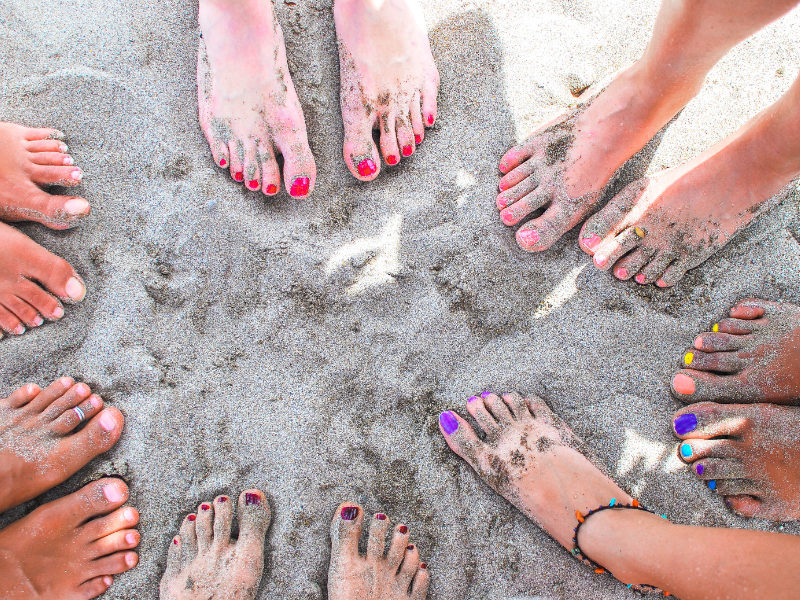Sun, sea and sand might sound like the perfect recipe for a relaxing summer break, but they can also be tough on your feet. From scorching sand to sharp shells, even the most stunning beach can pose risks to foot health.
Whether you’re planning a staycation on the British coast or jetting off abroad, this guide will help keep your feet healthy, comfortable and beach-ready all holiday long.
1. Don’t Let Hot Sand Scald Your Soles
It’s tempting to run barefoot onto the beach, but sun-soaked sand can reach extremely high temperatures — easily hot enough to cause burns, redness and blistering on your feet. Children and older adults are especially vulnerable.
Top tips:
-
Always check the temperature of the sand with your hand or toes before walking barefoot.
-
Stick to sandals or beach shoes when crossing hot areas.
-
If your feet do get burned, rinse them with cool (not ice-cold) water and apply aloe vera gel to soothe the skin.
2. Protect Feet from Harmful UV Rays
According to a survey by skincare brand Nivea, 29% of sun seekers neglect to rub sun cream into their toes, while 46% leave the tops of their feet unprotected and 57% their soles. Yet this delicate area is highly susceptible to sunburn. Don’t assume sandals will block the rays – the sun can reach your feet from multiple angles.
To protect your feet:
-
Apply a broad-spectrum SPF 30 or higher to the tops, soles, heels, and toes.
-
Reapply every 2 hours, especially after swimming or sweating.
-
Use a beach umbrella or towel for extra shade during peak hours (11am–3pm).
Sunburn on feet isn’t just painful – it increases the risk of long-term skin damage and melanoma.
3. Wear Supportive Footwear for Beach Activities
Planning to join a beach volleyball game or go for a jog along the shore? Sand may feel soft underfoot, but it’s unstable and can strain your feet, ankles and knees without the right support.
Avoid injury by:
-
Wearing trainers or supportive water shoes for any beach sports.
-
Swapping flip-flops for structured sandals with arch and heel support when walking long distances.
-
Using orthotic inserts if you have flat feet, plantar fasciitis, or other pre-existing foot conditions.
Proper footwear can prevent sprains, tendonitis and flare-ups of chronic foot pain.
4. Brush Off the Sand (Thoroughly)
Tiny grains of sand may seem harmless, but when trapped between your feet and shoes, they can cause painful friction, leading to irritation, blisters and even infection.
-
Rinse your feet with fresh water before putting shoes back on.
-
Dry them thoroughly – especially between the toes – to reduce moisture buildup.
-
Check your shoes for trapped sand before wearing them again.
A microfiber towel or baby powder can help remove stubborn sand quickly and comfortably.
5. Don’t Paddle Without Protection
Seaside paddling is a holiday favourite – but sharp shells, stones, broken glass, or coral can cause deep cuts, particularly when visibility is low.
Protect your feet by:
-
Wearing sturdy water shoes designed for the sea or rocky beaches.
-
Carrying a mini first-aid kit with plasters, antiseptic wipes and tweezers.
-
Avoiding paddling entirely if you have cracked heels, open wounds, or recent surgery on your feet.
Remember: seawater can harbour bacteria that may lead to infection if it enters broken skin. If a cut becomes red, hot or swollen, seek medical help quickly.
6. Avoid Unpleasant Encounters with Sea Creatures
Some sea creatures can pose more than just a surprise – they can sting, spike or cause severe pain if stepped on. In UK and European waters, weever fish are a common culprit.
To reduce your risk:
-
Shuffle your feet through the sand when entering the sea (it alerts creatures to your presence).
-
If stung, immerse the area in hot water (as hot as you can tolerate) and seek medical attention immediately.
Wear hard-soled beach shoes when walking in the water.
Lifeguards are trained in first aid and can provide fast treatment for marine stings.
7. Treat Your Feet Post-Beach
After a day in the sun, sea and sand, give your feet a little TLC.
Try this holiday footcare routine:
-
Soak your feet in warm water with Epsom salts or tea tree oil.
-
Moisturise dry or cracked skin with a hydrating foot cream, focusing on heels and soles.
-
Check for any cuts, swelling or signs of infection, especially if you’re diabetic or prone to foot issues.
Staying consistent with foot care can prevent minor irritations from turning into painful problems that disrupt your holiday.
8. Need Help Before or After Your Trip?
If you’re jetting off soon and want peace of mind about your foot health – or returning from holiday with an issue like cracked heels, fungal infections or nail damage – we’re here to help.
Feet By Pody’s London podiatrists offer:
-
Pre-holiday foot checks
-
Corn and hard skin removal
-
Fungal nail and athlete’s foot treatment
-
Custom orthotics for travel footwear
-
Tailored advice for diabetic foot care on holiday
Keep Your Feet Happy on Holiday
Your feet are your foundation – especially on holiday, when you’re likely walking more than usual. With just a little preparation and the right footwear, you can enjoy the beach without foot pain or problems.
Book a pre- or post-holiday appointment with Feet By Pody by calling 0207 099 6657 or booking online

